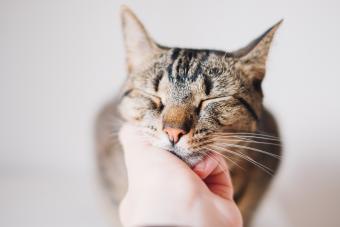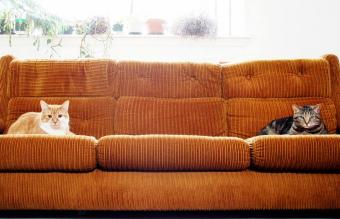
Cats are known for being more independent than dogs, but that doesn't mean they can't suffer from separation anxiety. If your cat won't leave your side, becomes destructive when you're away from home, or has simply started eating a little less than usual, there's a chance they might be suffering from separation anxiety. The good news is that you're not alone in dealing with this feline condition, and the better news is there are plenty of simple ways you can help your cat cope with separation anxiety.
9 Telltale Signs Your Cat has Separation Anxiety
Separation anxiety is a condition where your cat experiences distress when they're separated from you. Unfortunately, you can't be with them all the time, even if you want to. Cats with separation anxiety usually show a few or all of these nine symptoms:
- Greeting you with extreme excitement when you return home
- Attempting to escape when you leave the house
- Being overly affectionate
- Constantly following you around
- Excessive meowing
- Obsessive self-grooming
- Destructive behaviors (acting out, scratching, chewing, etc.)
- Urinating or defecating outside the litter box
- Changes in appetite (overeating or not wanting to eat when you're away)
Causes of Separation Anxiety in Cats

Is your cat showing a few or all the signs of separation anxiety? You might know what could have triggered this change, or you may have no clue. Either way, don't beat yourself up. Cats are very sensitive to changes in their environment, so something as minor as moving their favorite chair could have triggered their anxiety. Some of the common causes include:
- Changes in lifestyle (new pet, houseguests, moving house, etc.)
- Spending a significant amount of time with your cat and then suddenly being away from home
- Boredom while home alone
- Being left alone for long periods
- Negative experiences as a kitten
- Loss of a housemate
- Noise aversion
Unfortunately, some cats just have a genetic predisposition for separation anxiety. Certain breeds might be more prone to it than others, and studies show that female cats are more likely to be diagnosed with it than males.
Helping Your Cat Feel Comfortable Being Left Alone
If you're concerned that your cat has separation anxiety, the first thing you should do is have them examined by their vet. Unfortunately, a lot of the signs associated with separation anxiety can also be signs of illness. Cats are really stoic creatures, so even subtle changes, like increased affection or not eating quite as much as usual, could be associated with something brewing internally.
After you've ruled out any physical cause, you can take steps to help your cat cope with being left home alone. Patience is essential. Remember, your cat isn't happy about feeling anxious, any more than you are.
- Don't make a big deal about leaving. Leave silently to remove the anticipation.
- Leave frequently throughout the day for short periods. For example, walk to the mailbox, then return a few minutes later) to reduce the stress around your departure.
- Try calming cat pheromones. These can help your cat feel more at ease.
- Create a kitty playlist. Put a cat-specific playlist with sounds your cat loves on for your kitty while you're gone.
- Turn on the television. Play some "cat TV" to keep them engaged while you're away.
- Get them some fun, interactive toys. Provide your cat with enrichment activities and toys while you're away from home.
- Give them a quiet corner to rest. Create a safe, comfortable space for your cat to retreat to where they can be alone.
- Consider medications. Speak to your vet about anxiety medications for severe cases of cat separation anxiety.
Bonus No. 9: Statistics suggest that cats without any other pets in the house are at higher risk for separation anxiety. If you think it won't cause your cat even more stress, consider getting a housemate to keep them company.
Curb Separation Anxiety with Compassionate Care
It might sound endearing to know your cat loves you so much that they can't bear to be away from you, but it can be really distressing for the little guy when you're not there. Fortunately, with the help of behavior modification, you can help them feel confident when they're alone. And if these don't resolve the problem, there's absolutely no shame in turning to pharmaceuticals to reduce your cat's anxiety.







